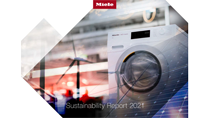Press releases
Miele Professional: Making industry history and consistently reinventing itself

-
From drum washing machine to full-service provider in the areas of laundry, dishwashing, laboratory and medical technology
-
Complete solutions for hospitals and the pharma industry take on increasing significance
In Miele's 125-year history commercial products have played an important role from early on. The impetus for today's Professional Business Unit was the first drum washing machine, introduced in 1924. It was designed for laundry facilities, hotels, hospitals and sanatoriums. For more than a century this division has consistently evolved, developed new business segments and is currently responsible for approximately 15% of Miele´s Group turnover. The last decade has been particularly characterised by investments in the medical technology sector. A look at the history.
The drum washing machine in question was very different from the wooden tub washing machines that Miele produced for domestic use. The device was fired with gas or coal and heated the water directly in the machine. The horizontally supported, electrically-driven metal drum was made of copper and accommodated more laundry than was possible in a wooden barrel. Progressive even at that time: Miele relied on heat recovery. Before the exhaust gases exited through the chimney they heated the wash water and rinse water in an attached hot water tank.
In the 1950s the design of the washing machine fundamentally changed. With the commercial Model 307, for the first time Miele used a porthole through which the laundry could be observed. Later this new look was also characteristic of the washing machines offered for private households. Moreover, the first fully automatic washing machine, with the slogan, “Der ganze Kniff – nur ein Schaltergriff” (The whole trick – just one switch), was configured for small commercial enterprises and confirms the fact that at Miele, innovations in the household appliance sector and the commercial sector have always been reciprocally implemented. The same can be said for dishwashers, which Miele manufactured in Bielefeld: In 1961 the Model G 11 offered dishwashing times between seven minutes (hot water connection) and ten minutes (cold water connection); this was a huge time saver, particularly in the hospitality industry.
New offerings for smaller commercial enterprises came later also in the laundry care area. The key words here are “Kleine Riesen” (Little Giants). In 1977 these machines, for example, for use in hair salons or guest houses, started a success story that continues today. Compact design combined with robust professional technology is the distinctive characteristic of the household washing machines and dryers.
Professional cleaning and disinfection solutions for hospitals and laboratories
In 1961, with the G 15 thermal disinfector, Miele has been professionally rinsing off and eliminating pathogens on tableware through thermal disinfection. With this product, for the first time in its corporate history Miele had developed a device which in one work step both rinses off and – without chemicals, solely by means of high temperature – also disinfects tableware. Thus, with dishwashers as well Miele won a place for itself in the ward kitchens and kitchenettes of many hospitals. A derivation of this technology, the Model G 16, a special device for cleaning glassware in laboratories, was also launched on the market. In retrospect, 1961 is the year that Miele entered the medical technology sector.
The growth required additional capacities. In 1962 in Bürmoos (Austria), Miele constructed its first plant outside of Germany. Initially this site manufactured spin dryers and lightweight irons. Today the plant provides application-specific stainless steel baskets and inserts for automatic cleaning and disinfecting units. A few years later in Lehrte in Lower Saxony, Miele acquired the former Gillette plant and ever since this plant has been producing the complete spectrum of larger commercial washing machines, dryers and rotary irons.
In subsequent decades Miele has consistently set milestones for hygiene processes. For example, in 1994 for the hospital sector with the new Vario TD cleaning and disinfection program which to this day is considered the market standard. It replaced the so-called “BGA Seuchen” program as the routine program. Oxivario followed ten years later, a process that enables cleaning of medical instruments that the Robert-Koch Institute classifies as critical. Among other things, Oxivario is effective against surface-bound prions, the pathogens that cause Creutzfeld-Jacob disease which made headlines under the name “mad-cow disease”.
The step to full-service provider
The competencies acquired over the years in the areas of cleaning and disinfection were bundled in the next phase. With high-capacity sterilisers from the Bürmoos plant and small sterilisers, starting in 2010 Miele established itself as a full-service provider for all stages of instrument preparation. From this point on Miele offered the planning and equipping of central sterile services departments in clinics and hospitals, but also for medical practices and dentists. In addition to the devices, on request Miele also provides the chemicals, the service and on top, supports data management.
The company also developed a new business sector in the area of commercial laundry care. In 2016, collaborating with the Italian launderette chain Lava Più, Miele introduced a concept for the turnkey fitting out of a launderette. Since 2022 Lava Più has been a 100% Miele enterprise and is expanding under the brand Bloomest internationally. In 2019 appWash followed, a provider of digital system solutions for communal laundry facilities, for example in student dormitories.
Additional investments in the growth markets medical technology and pharma industry
In 2017, Miele acquired the majority stake in Steelco Group, an Italian company specialising in medical technology, founded in 2001. This is where Miele has bundled its entire hospital project business. Steelco has since become a 100% Miele enterprise. Acquisition of the Steelco Group included two new production locations in Miele's plant network, Riese Pio X and Cusano di Zoppola. In addition to cleaning and disinfection devices as well as sterilisers for the hospital sector, the company also offers special devices for the pharma industry.
Data documentation is absolutely essential in the medical technology segment and in the launderette segment. Consequently, since 2021 Miele has provided a digital platform, Miele MOVE, which supports many aspects of commercial management. For example, the runtime data and status data of all machines can be retrieved in real time and remotely. Among other things this function facilitates scheduling of personnel. Moreover, consumables can be easily ordered via the platform and a direct connection to the service organisation can be established as needed.
The market for medical technology products and pharmaceutical products is growing continuously worldwide. Miele sees major potential in these markets and in 2023 announced a joint venture with the Swiss industrial holding Metall Zug, which after obtaining the consent of the responsible authorities started trading under the brand SteelcoBelimed. In the joint enterprise Miele brings its Steelco Group, Metall Zug its two Belimed companies Infection Control and Life Science. Miele holds 67 percent and Metal Zug holds 33 percent of the joint venture. With its portfolio of hygiene solutions for hospitals and the pharma industry SteelcoBelimed is among the largest players on the market and will be further developed to become the most customer-orientated, most innovative, and the most reliable provider in these sectors.
Quality that lasts
In spite of all innovations and newly added business segments there are three things at Miele Professional that have not changed: The outstanding reliability, robustness, and long service life of the products. For instance, depending on the product group, the commercial appliances are tested for a use of up to 40,000 duty cycles. Another factor that contributes to a long and productive appliance life is the fact that Miele keeps its vital spare parts available significantly longer than is customary in the industry. For the professional appliances alone, more than 28,000 components are available for up to 15 years after the product series is discontinued through its own stockkeeping. For decades reparability has been a routine that is lived daily at Professional and this is a strong advantage in terms of sustainability, but it's not the only one. With a view towards climate protection and cost-efficiency, Miele continues to further reduce consumption of power and water. The fact that Miele succeeds in this regard without compromising performance, results, or convenience can be attributed to innovative technologies such as heat recovery, drying with heat pump or hot water, which is only available at Miele.
The Professional Business Unit employs more than 3,000 people and manufactures its products at the locations Bielefeld, Gütersloh, Bürmoos, Lehrte, Uničov, Riese Pio X and Cusano. In 2023 Professional achieved record turnover and contributed €819 million to Miele's consolidated turnover.
Company profile: Miele is recognised as the world's leading supplier of Premium domestic appliances, with an inspiring portfolio for the kitchen, laundry and floor care. The company also offers machines, systems and services for use in hotels, offices, care and medical technology. Since its foundation in 1899, Miele has lived up to its brand promise of "Immer Besser" in terms of quality, innovation, performance and timeless elegance. With its durable and energy-saving appliances, Miele helps its customers to make their everyday lives as sustainable as possible. The company is still owned by the two founding families Miele and Zinkann and has 15 production plants, eight of which are in Germany. Around 22,700 people work for Miele worldwide and the company's most recent turnover was 4,96 billion Euro. The company has its headquarters in Gütersloh in Westphalia.
Media information
| Description | Download |
|---|---|

In 1924, the first drum washing machine with a copper boiler marked the start for commercial products from Miele (photo: Miele) |
|
| High Resolution JPG | |

Thermal disinfector for rinsing and disinfecting operating room instruments in hospitals. In 1961 Miele entered the medical technology segment. (Photo: Miele) |
|
| High Resolution JPG | |

Starting in the 1950s Miele fitted out launderettes with its products. (Photo: Miele) |
|
| High Resolution JPG | |

When it's got to be fast, Miele commercial dishwashers also assist in the butcher shop. (Photo: Miele) |
|
| High Resolution JPG | |

Compact and with professional technology: In 1977 Miele's “Little Giants” started a success story that continues today. (Photo: Miele) |
|
| High Resolution JPG | |

Germs don't have chance: For example, washing systems with a clean side and an unclean side are in demand in hospitals. (Photo: Miele) |
|
| High Resolution JPG | |

With the Miele MOVE digital platform users can always view the status of their appliances. (Photo: Miele) |
|
| High Resolution JPG | |

Cleaning and disinfection in medical practices. For instrument preparation, Miele offers special baskets as the well as the requisite process chemicals. (Photo: Miele) |
|
| High Resolution JPG |


